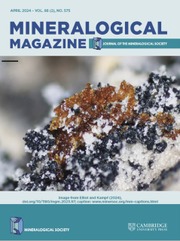Article contents
Evaluation for internal consistency in the thermodynamic network involving fluorite, cryolite and villiaumite solubilities and aqueous species at 25°C and 1 bar
Published online by Cambridge University Press: 13 May 2022
Abstract
Thermodynamic data are constrained by the interrelated thermodynamic equations in addition to the observational measurements and their uncertainties. The consequence is a network of thermodynamic properties that can be evaluated for their internal consistency. In this study, three fluoride minerals that can cause high fluoride concentrations in groundwaters are evaluated for their solubilities and their internal thermodynamic consistency with calorimetric, isopiestic and electrochemical measurements: fluorite, CaF2, cryolite, Na3AlF6, and villiaumite, NaF. This evaluation involves the three solids and 13 aqueous species, the free ions of Ca2+, Na+, Al3+ and F–, and the hydroxido and fluorido complexes of Al3+, and the CaF+ ion pair. For the fluorite–cryolite–villiaumite–aqueous species network, the number of components is minimal, and the solubility studies are mostly of high quality. Re-evaluations of original data using PHREEQC helps to broaden the quantitative evaluation of thermodynamic properties and to resolve apparent discrepancies. A check on this thermodynamic network shows that through a careful appraisal of the literature, a highly consistent set of values can be derived. The resultant infinite-dilution solubility-product constants at 25°C and 1 bar are: for fluorite solubility, logKsp = –10.57 ± 0.08; for cryolite solubility, logKsp = –33.9 ± 0.2; and for villiaumite solubility, logKsp = –0.4981 ± 0.003.
Information
- Type
- Article
- Information
- Creative Commons
- This is a work of the US Government and is not subject to copyright protection within the United States
- Copyright
- Copyright © U. S. Geological Survey, 2022. Published by Cambridge University Press on behalf of the Mineralogical Society of Great Britain and Ireland
Footnotes
This paper is part of a thematic set that honours the contributions of Peter Williams
Associate Editor: Juraj Majzlan
References
- 5
- Cited by

